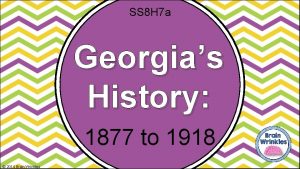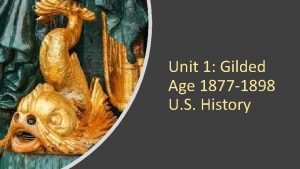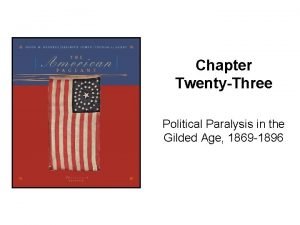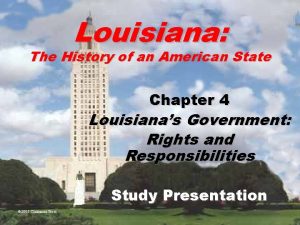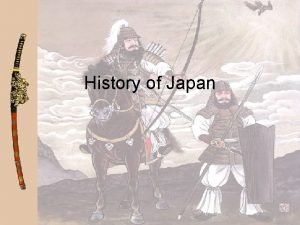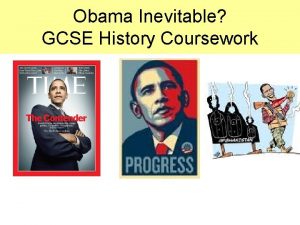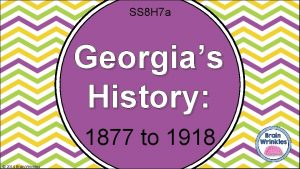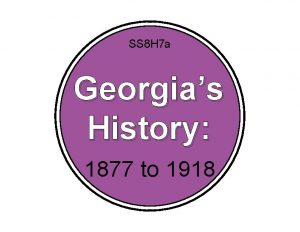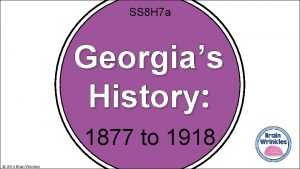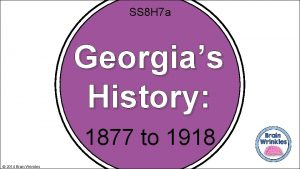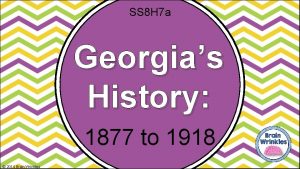SS 8 H 7 a Georgias History 1877
































- Slides: 32

SS 8 H 7 a Georgia’s History: 1877 to 1918 © 2014 Brain Wrinkles

Bourbon Triumvirate • After Reconstruction, Democrats known as “Bourbons” rose to power in the South. • Bourbons believed that the South should rely less on agriculture and more on industry. • In Georgia, three Bourbon leaders dominated the state’s politics from 1872 to 1890: Joseph E. Brown, John B. Gordon, and Alfred H. Colquitt. © 2014 Brain Wrinkles

Bourbon Triumvirate • The Bourbon Triumvirate supported policies that replaced Georgia’s former large plantation-owning class with a new middle and business class. • They also expanded railroads and increased industrialization, and gained wealth as railroads, cities, and factories flourished in Georgia. • They promoted “white supremacy” in order to keep the political support of white racists. © 2014 Brain Wrinkles

Joseph E. Brown • Joseph Brown was a secessionist who was Georgia’s governor during the Civil War. • He served four terms as the state’s governor until he was named chief justice of the Georgia Supreme Court. • Brown eventually served Georgia as a US Senator from 1880 -1891. • He became one of the state’s wealthiest men. © 2014 Brain Wrinkles

Joseph E. Brown © 2014 Brain Wrinkles

John B. Gordon • John B. Gordon was a Civil War general who later became the leader of the Ku Klux Klan in Georgia. • He became a US Senator in 1872 and resigned in 1880. • In 1886, Gordon became Georgia’s governor for two terms. • He returned to the Senate for one more term before leaving politics. © 2014 Brain Wrinkles

John B. Gordon © 2014 Brain Wrinkles

Alfred H. Colquitt • Alfred H. Colquitt was educated at Princeton University. • He owned slaves before the Civil War and served in the Confederate army. • Colquitt was a Methodist Minister and often taught Sunday school in black churches. • Colquitt served as the state’s first democratic governor after Reconstruction from 1877 to 1882. © 2014 Brain Wrinkles

Alfred H. Colquitt © 2014 Brain Wrinkles

Henry Grady • Henry Grady was editor of the Atlanta Constitution from 1880 to 1889, and used his newspaper to promote what he labeled the “New South”. • Grady believed the South needed to stop relying on farming and become more like the North economically. • He tried to get northern businesses to invest in the South, and convinced many northerners to invest in Atlanta. © 2014 Brain Wrinkles

Henry Grady © 2014 Brain Wrinkles

Cotton Expo • In 1881, Henry Grady promoted Georgia’s first International Cotton Exposition, an industrial fair that spotlighted attention on the state’s cotton textile industry. • The exposition attracted 200, 000 paid visitors and showed the country that Georgia was ready for more industry. • Georgia went on to host more expositions, attracting people from 33 states and 7 countries. © 2014 Brain Wrinkles

1881 Atlanta International Cotton Expo © 2014 Brain Wrinkles

Tom Watson • During the 1880 s, most farmers were suffering economically and falling further and further into debt. • Cotton prices had dropped dramatically and labor was hard to find after slaves were freed. • Georgia lawyer Tom Watson criticized Grady’s New South because he claimed it hurt small farmers. • In 1890, Watson won a seat in Congress and argued for farmers’ issues in Washington. © 2014 Brain Wrinkles

Tom Watson © 2014 Brain Wrinkles

Populists • In 1891, the People’s Party (commonly known as Populist Party) was organized by farmers and Tom Watson became the party’s leader in Georgia. • Watson’s greatest reform was the Rural Free Delivery Bill which provided free mail delivery to rural farmers. • Populists fought to help farmers and urged farmers to work together for their cause. • The Populists challenged the dominate Democratic Party in Georgia by threatening to split the white vote and to bring in black Republicans. © 2014 Brain Wrinkles

© 2014 Brain Wrinkles

Rural Free Delivery Service © 2014 Brain Wrinkles

County Unit System • Many rural Georgians became to fear that they were being pushed out of the political process. • In response, the state adopted the county unit system in 1917 for its political primaries. • Under the unit system, the candidate that won the most unit votes won the election. • The eight most populous counties received 6 votes, with each of the remaining counties receiving less. © 2014 Brain Wrinkles

County Unit System • Whoever won the most votes in the county, got all of the county’s unit votes. • The effect was that small, rural counties ended up having more say over who won than heavily populated counties. • Even though most of the population lived in a handful of counties, the rest of the counties had enough unit votes to determine the winner all by themselves. © 2014 Brain Wrinkles

© 2014 Brain Wrinkles

County Unit System • Many saw the county unit system as unfair because it meant that certain candidates could win even if the majority of the people in the state voted for someone else. • The system did not represent the population fairly and in 1962, the U. S. Supreme Court ruled against the county unit system. © 2014 Brain Wrinkles

Rebecca Felton • Rebecca Latimer Felton was the wife of progressive congressman William H. Felton, who opposed the Bourbon Democrats. • Felton was active in politics and was the South’s bestknown campaigner for women’s suffrage. • Although Georgia disappointed her by rejecting the 19 th Amendment, enough states eventually ratified it and women won their right to vote in 1920. © 2014 Brain Wrinkles

Rebecca Latimer Felton © 2014 Brain Wrinkles

Rebecca Felton • Two years later, 87 -year-old Felton served as one of Georgia’s US Senators when the governor appointed her to fill the seat of deceased Tom Watson until a special election could be held. • Although she served for only two days, Felton made history as the first woman to sit in the US Senate. © 2014 Brain Wrinkles

1906 Atlanta Riot • The period from 1890 to 1930 was the bloodiest period of racial violence in Georgia’s history. • In September 1906, growing racial tensions resulted in the three-day Atlanta Race Riot. • A white mob started the riot, in part due to unproven reports that black men had assaulted several white women. © 2014 Brain Wrinkles

© 2014 Brain Wrinkles

1906 Atlanta Riot • Hoke Smith was running for governor and contributed to the racial tension with his appeals to white racism in an attempt to win votes. • The mob attacked black-owned businesses and killed several business owners. • At least 12 people died during the violence. © 2014 Brain Wrinkles

Leo Frank Case • African-Americans were not the only targets of ethnic violence during the early 1900 s. • Leo Frank was a Jewish factory superintendent in Atlanta. • In 1913, he was convicted of murdering Mary Phagan, a 13 -year-old female worker. • The trial was filled with conflicting testimony and unanswered questions. © 2014 Brain Wrinkles

Leo Frank Trial © 2014 Brain Wrinkles

Leo Frank Case • Frank was sentenced to life in prison, but two years later, citizens from Mary’s hometown in Marietta kidnapped him and hanged him from an oak tree. • Decades later, new evidence revealed that the murder was most likely committed by someone else. • The state pardoned Frank 71 years after his lynching, but the case symbolized Southerners’ strong anti. Semitic feelings at the time. © 2014 Brain Wrinkles

© 2014 Brain Wrinkles
 Georgia history timeline 1877-1919
Georgia history timeline 1877-1919 Georgias climate
Georgias climate Georgias regions
Georgias regions Georgias region
Georgias region Georgias geography
Georgias geography Georgias colony
Georgias colony The gilded age 1877 to 1898 worksheet answers
The gilded age 1877 to 1898 worksheet answers Define compromise of 1877
Define compromise of 1877 Period 5 key concepts apush
Period 5 key concepts apush Whats the compromise of 1877
Whats the compromise of 1877 1894 railroad strike
1894 railroad strike Compromise of 1877
Compromise of 1877 1877 golden 1
1877 golden 1 The key tradeoff featured in the compromise of 1877
The key tradeoff featured in the compromise of 1877 Gilded age labor strikes
Gilded age labor strikes Tanssija 1877-1927
Tanssija 1877-1927 Compromise of 1877 apush
Compromise of 1877 apush 1877-1865
1877-1865 History also history physical
History also history physical Brief history of testing
Brief history of testing History of maternal and child health
History of maternal and child health Louisiana the history of an american state
Louisiana the history of an american state History of firewalls
History of firewalls Ivan sutherland head mounted display
Ivan sutherland head mounted display Definition of jazz dance
Definition of jazz dance Apwh thesis
Apwh thesis Au bon catering
Au bon catering Seppuku definition ap world history
Seppuku definition ap world history Sistem otomatisasi kantor
Sistem otomatisasi kantor Mining user similarity based on location history
Mining user similarity based on location history The open group architecture framework
The open group architecture framework Gcse history coursework
Gcse history coursework Warwick history dissertation
Warwick history dissertation
